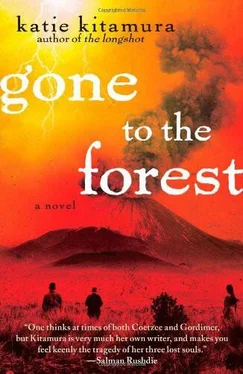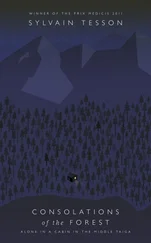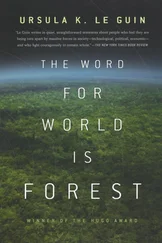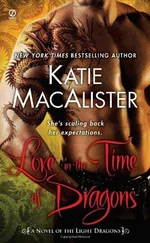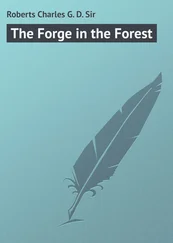The table is silent. Tom can hear her chewing. The indelicate chomping of her teeth and the loud gulp when she swallows. She continues chewing as she reaches for her water glass. They sit and stare at the girl. She takes a long swallow of water to wash the food down. Then she looks directly at his father and smiles — smiles so the rims of her teeth, which are small and white, show between her lips.
“I like it.”
He nods and smiles.
“Thomas caught the fish earlier today.”
He looks at his son. She follows the old man’s gaze and turns to look at Tom. She is still smiling. There is nothing timid about her now. Her eyes are bold and jumping. He looks into them and the corners of her mouth turn further upward. Like she is amused. Confused, he glares at her then looks down at his plate and forks up a mouthful of fish.
“Thomas is a natural fisherman. It is in his blood.”
Tom knows his father is making fun of him. The old man smiles at him. Tom nods and then looks away. It amuses the old man to mock his son in front of strangers. Not that Tom cares what Mr. Wallace and Mrs. Wallace and this girl think. He does not care in the least.
“Thomas is a young man of many abilities.”
Now his father is looking at the girl. He is still smiling. The girl is watching him and despite all her wiles she is in danger of growing fascinated. Tom can already tell. His father is more than twice her age but her eyes are pinned to his lips as he speaks to her in his fur-lined baritone. The old man cheats wild horses of their freedom with this voice. It runs deep into his chest, silky smooth and dry.
Tom dislikes the girl and is fearful of her. But he does not want her to her fall into the old man’s trap. Tom lives at the bottom of the trap. There is not very much space and he does not want to share his father with her. Tom has spent a lifetime watching people fall down the hole. He has never enjoyed the company. The girl looks at his father. She widens her eyes. It is too late, he thinks. She is already falling.
“Thomas can take you fishing some time. If you like.”
“I would like.”
She says the three words evenly and quickly. What she says — the would and the like —has nothing to do with fishing or with Tom or with anything that has been discussed at the table, anything that has been said out loud, since they arrived on the farm in their car.
Or perhaps it does. Have to do with everything that has happened since they arrived. Because now his father leans forward. His eyes rest on Tom and then return to the girl. He smiles. She smiles. The whole table smiles. Mr. Wallace and Mrs. Wallace sit back and for the first time that evening Mr. Wallace cracks a smile that is broad as daylight.
Only Tom does not smile. He glares at the dinner guests. They would do better to be cautious. They are beaming at his father — they grin and grin, mouths wide open — but they would do better to be aware of the situation they have walked into. Whatever that situation may be. The Wallaces are fools. They are no match for his father.
THE NEXT DAY Tom oversees the storage of the outdoor furniture. All summer the lawn and veranda are dotted with daybeds and settees. Today they gather the furniture from the lawn — the sign that the summer season is officially over. It is a full day’s work. The servants bring the tables and chairs to the veranda. The wood needs oiling and there are necessary repairs.
Tom stands in the middle of the fray. He directs the servants. He inspects the polish. He checks the removal of the stains. His father stops to observe the proceedings. He brushes a hand against the wood. It has been made to order in the style of the furniture back in the old country. A reminder of the separation between the farm and the rest of the country, it is also the separation itself. The barrier being made of furniture and teapots. The old man nods approval and waves to the servants to continue. Then he motions for Tom to follow.
They walk around the veranda and out to the lawn. His father stops and looks in the direction of the servants on the veranda. They are bent over the furniture. Two men pick up a table and move in the direction of the storeroom.
“That’s a good job.”
Tom is pleased. It is true it is a good job. He has exerted himself today, they all have. He notes that his father is in a good mood. Perhaps he slept well. The Wallaces left early, knowing better than to wear out their welcome. The farm is theirs again. Tom stands beside his father, in what he believes to be the glow of his approval.
The father invites the son to sit down. There are two chairs that have not been taken in, that stand forgotten in the middle of the lawn. Tom sits down. His father sits down next to him. He crosses his legs at the ankles. He folds his hands into a steeple and taps finger to knuckle. Buh buh buh. He sits and watches his son. He does not look out at the land. He does not look at the river, which is visible down the slope of land and through the trees. He looks at Tom.
“What do you think of Carine?”
Tom shrugs.
“She is pretty, no?”
Tom stares at his father. He cannot believe that his father can be serious about this girl and yet. And yet he is sitting here in this way, with his son, and he is telling him that he finds the girl pretty. He shakes his head. His father smiles and looks amused.
“No? Come, Thomas. You must admit that she is pretty.”
He shrugs again.
“For a country boy you have high standards.”
The old man pauses. Is watching him.
“Mrs. Wallace hoped you might take a fancy to the girl.”
His father, still watching him. The realization dawns on Tom. The girl is intended for him. That was the purpose of the visit. The meaning of the looks that passed between the Wallaces and his father. He does not easily believe it — he approaches the idea cautiously, because it is not often that the father thinks of the son.
But what does he think of the girl? The thought of her returns abruptly and he does not know what he thinks. He thinks of her pale skin and her small sharp teeth and before he knows it the girl is settling inside his mind. Turning and making a home for herself there. He shakes his head.
“Soon you will be running the farm.”
Tom looks up. His father has never said this, he has never put it into words. The promise has been understood but never actually stated. The date never articulated in terms such as soon. But now the old man has spoken the words and the difference is palpable, the difference is clear as daylight. Tom clears his throat. He tries to smile. He would like to thank his father but knows it would not be the thing. His father continues. More gently.
“You will. And when you do, a woman—”
He pauses, as if in consideration of his own past. He makes a minor correction.
“—a woman, of the right kind, will be a great help.”
He wonders if his father believes that the girl is a woman of the right kind. A woman of the right kind, for a certain kind of thing. The thought of the girl returns to him like a flood and she kicks inside his brain.
“I told Mrs. Wallace that I thought you were not opposed to the idea.”
He pauses.
“I thought that she liked you. Did you not?”
It has been decided. He hears the decision in his father’s voice. It is almost a comfort. For a second he thought his father was asking. The idea of the girl and the idea of his choice — a choice, the choice of a woman — had spread through his body like a rash. Now the idea is gone and his body is restored to health. He nods and considers the slope of land running to the river. Soon to be his.
“Take her fishing.”
A courting amongst the dorado — a terrible thought. Tom is now an excellent fisherman. On a good day he can outfish his father. He is slow and obstinate — good qualities in a fisherman. Whereas his father sees the sport as a contest of wills, a question of winning and domination. He is too easily drawn in. Tom only wants to capture the fish and bring it home and eat it.
Читать дальше
